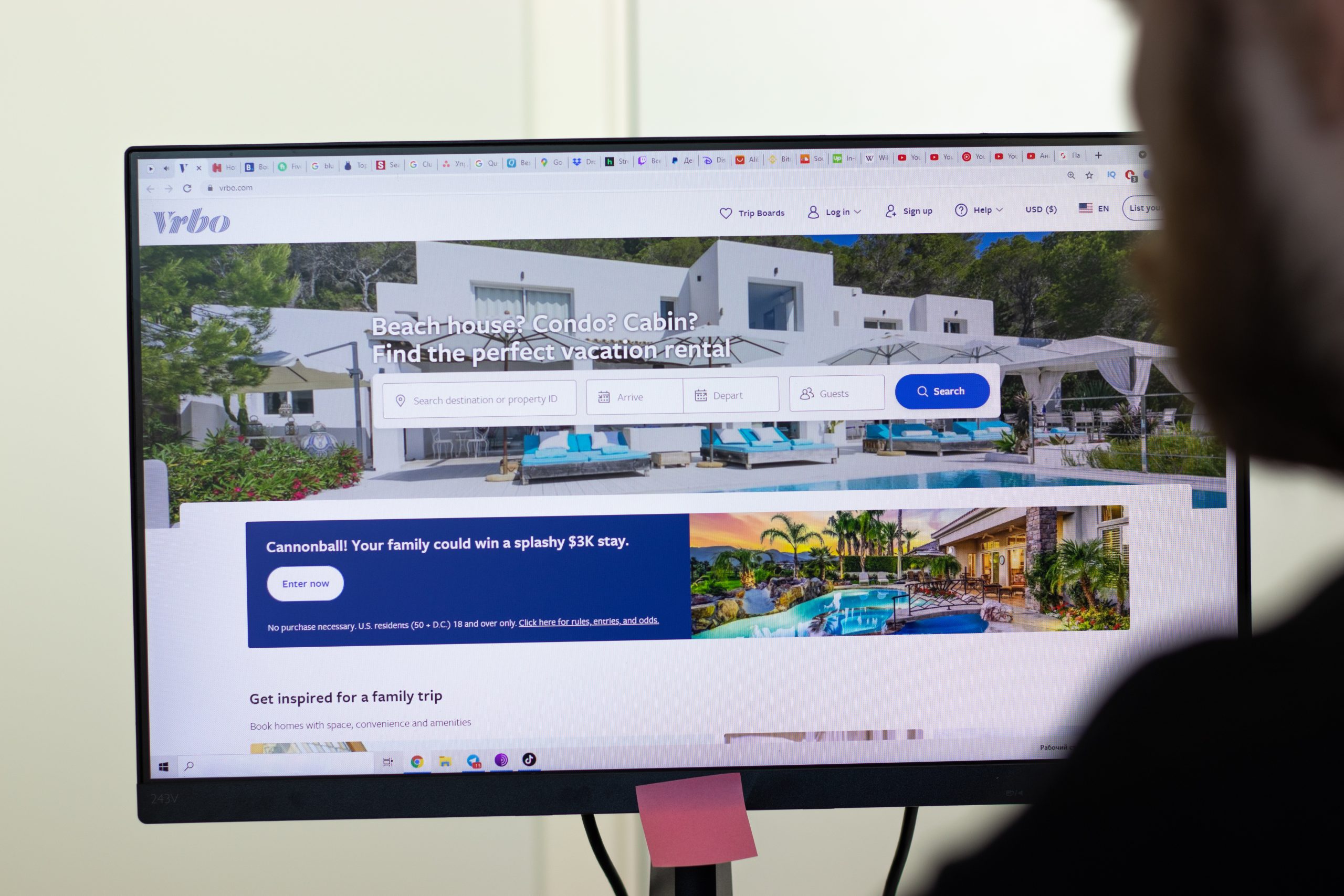Vrbo, as one of the largest vacation rental listing sites in the United States, is extremely well-known among short-term rental owners and property managers. You probably have a property listed on Vrbo now, have in the past, or will in the future. As a result, it’s a good idea to learn the ins and outs of their damage deposit policies.
Because you are putting in the effort to maintain a beautiful property, ensuring that the proper parameters are in place to protect your vacation rental is the best way to ensure that irresponsible guests don’t ruin your hard work.
Damage deposits hold both the guest and the host accountable for keeping the property in good condition. Though serious damage is uncommon, it is normal to expect some wear and tear as guests come and go regularly.
In this guide, we will go over the various damage deposit options on Vrbo, how to add damage protection to your listing, and why this is important to you as a host. We’ll also go over some frequently asked questions about Vrbo damage deposits to help you protect your property in the way that works best for you.
How can you protect your Vrbo property from potential damage?
Vrbo will provide numerous mechanisms to protect your property from potential damages as a host. Examples of covered damages include broken glass or appliances, furniture, and any additional cleaning required due to pet dander, smoking, or undeclared pets or guests.
To reduce risks, guests are also aware that they are responsible for property damage at multiple points throughout the booking process (on the property description page, under House Rules, at checkout, and after the booking).
Furthermore, establishing a reasonable damage deposit policy for the guest and covers all of your bases as the host is a critical step when listing your property on Vrbo.
Aside from the damage deposit, another way to protect your Vrbo property from potential damage is to create a short-term rental agreement that details the current state of the property and what procedure will be followed if the damage is discovered. Having your guests sign this contract before arrival ensures no miscommunication about how they should treat the property.
This can also help to eliminate the possibility of guests filing a dispute if/when you need to file a damage claim. It should include information such as what types of damage will result in the guest losing their refund and how they will be refunded if no damage is discovered. You can also communicate your expectations regarding events, pets, children, and smoking under House Rules. The clearer your house rules are, the easier it will be for guests to follow them.
Vrbo damage deposit
The Vrbo damage deposit is a policy put in place to protect properties and hold all parties accountable. The guests are responsible for treating your property with respect. You are responsible for ensuring that it is well maintained and inspecting the property after each stay to determine whether a damage claim needs to be filed.
Many other vacation rental platforms, such as Airbnb, Booking.com, and Expedia, have very similar damage deposit policies. Currently, the default is for Vrbo to store the card on file (more information below), but in the past, the default was a refundable damage deposit charged at the time of booking.
As the host, you have a lot of control over which Vrbo security deposit option you want to add to your listing and the amount/level of coverage. Vrbo provides three different options for damage deposits, which we will go over in more detail below.
What is the average amount of Vrbo damage deposits?
The damage deposit amount does a few things: it ensures that you are covered for any potential damage and encourages renters to take good care of your property, but it does not deter potential guests from viewing your listing. If the price is too high, a potential guest may reconsider. If it’s too low, it may give the wrong impression about the quality of your listing. You must choose the amount wisely! You can either set a fixed damage deposit amount or charge a percentage.
In general, hosts set a fixed damage deposit of $250-500$. If you prefer to charge a percentage, 10% of the total rent is standard. If you do the math and 10% is significantly higher than the fixed amount, it’s generally better to charge the percentage. When in doubt, look at what other hosts are charging for properties similar to yours and base your decision on that.
Additional insurance
A good vacation rental insurance policy is also an important step in protecting your property. Vrbo recommends Proper Insurance to hosts as the best option for vacation rental insurance, and it replaces any homeowner or landlord insurance you may have in place now.
How do Vrbo damage deposits work?
When listing your property as the host, you have a few options for damage deposits. For example, you can specify the amount of your Vrbo refundable damage deposit and whether it will be refunded seven or 14 days after guests check out. As you can see, you have a lot of freedom in selecting the best policy for your property! You can modify all of these settings through your Vrbo account.
It’s important to remember that while the damage deposit is added to the total when a guest makes a reservation, the funds are not deposited directly to you. Vrbo holds the deposit for the duration of their stay, and then you have seven or fourteen days to file a damage claim if you discover an issue with the property. Only then will you be able to withhold a portion or the entire deposit. Let’s go over your damage deposit options in greater depth.
A card on file
Vrbo changed the default from a refundable damage deposit to the card on file in 2020. This means that unless you specifically change it, this is the damage deposit policy that is currently in effect for your listing.
For this option, Vrbo stores the guest’s credit card information at the time of booking (you do not have access to this information). Then, you have up to 14 days after checkout to file a claim for any damages you discover on the property. The guest will be notified of the claim via email, which will include a message from you describing the damage, and their card on file will be charged for the amount you specify (whether that is the whole deposit or only a portion).
Vrbo card on file
Vrbo states that they will cover all valid claims up to the amount you set as your damage deposit, even if they cannot successfully charge the guest’s card (in the case that it is expired or maxed out). You may be concerned about using the card on file option due to the lack of security, but rest assured that you should be covered in damage.
Though Vrbo does not require photo evidence when filing a claim, it is always a good idea to take as many photos as possible to document the damage. You can keep these for your records and also send them to the guest to explain why you are filing the claim.
If you need to file a damage claim, it is best to message the guest ahead of time, describing the damage with photos, so they aren’t surprised by the Vrbo claim email.
A refundable damage deposit
Another option for your listing is an upfront refundable damage deposit. This option allows you to specify a deposit amount the guest will be charged at the time of booking.
At checkout, the guest will see this charge in addition to the rent, cleaning, and service fee in the price breakdown. Consider this a precautionary charge if you discover any damage while assessing the property. The deposit, however, does not go directly to you; Vrbo will hold it throughout the booking process and the guest’s stay.
You then have up to 14 days after checkout to inspect the property, and if you do not file a damage claim with Vrbo within that time frame, the amount is automatically deposited back to the guest. If you discover damage, you may file a claim and withhold up to the deposit amount.
Vrbo prioritizes processing these claims as quickly as possible, but keep in mind that the deposit may take up to seven days to arrive in your account. If you claim less than the deposit, the guest will be refunded the difference.
Charging a refundable damage deposit may appear to be the safest option, but it has a drawback. A Trustpilot analysis of 100 guest reviews shows that charging a refundable damage deposit can influence guests’ booking decisions. 6% of guests thought the damage deposit was too high, and 8% said they no longer trusted Vrbo after deposit issues. If you choose to use a fundable damage deposit, ensure the amount is reasonable and communicate your expectations to guests.
A property damage insurance policy
Finally, you can require guests to purchase property damage protection when they book instead of a damage deposit. Vrbo provides damage protection insurance through Generali Global Assistance, with several options for varying levels of coverage. If you choose this option, you can specify the amount of coverage you require. Guests will see the property damage protection charge at checkout and the refundable deposit.
Essentially, this is just an insurance policy that guests purchase to cover any damage that may occur during their stay. Consider it like purchasing a short-term renter’s insurance policy.
The advantage of this option is that it guarantees you will be covered for any damage up to the amount you specify. What’s the disadvantage? The fee guests pay (which is usually much lower than the refundable damage deposit) is not refunded after the trip. It’s like a happy medium between the two previously mentioned options. You can avoid any concerns from guests about not receiving their refund, but charging a card on file can feel more secure.
How do you add damage protection to your listing?
It is very simple to add damage protection to your listing! Simply follow the steps below:
1.Log into your Vrbo account.
- Choose which listing you want to add damage protection to, then Calendar, Settings, and then Damage protection
- Choose between Damage deposit (in which case you must enter an amount) and Property damage
- Protection (in which case it will ask you to choose a coverage amount)
- If you do not go through this process, the card on file option is the default.
How do I make a Vrbo damage deposit claim?
As previously stated, you will have up to 14 days after a guest checks out to inspect the property and file a damage deposit claim if necessary. When you file a claim, Vrbo will ask you to describe the damage, and that description will be shared with the guest.
To file a damage claim:
1.Log into your Vrbo account.
- Choose which listing you want to submit a claim for.
- Choose the guest’s name.
- Select Inbox.
- Select Damage protection.
- Select Report damage.
- Enter the amount you want to claim (not more than the total deposit)
- Write a brief but detailed description of the damage (remember, this will be sent to the guest).
- Select Confirm.
Outside of the formal claim filing process, we strongly advise you to message the guest through Vrbo about the damage you discovered, how much you are withholding from the deposit, and include any photos.
It is not only the best way to be a respectful host but also reduces the likelihood of guests filing a complaint. You will also have written proof that you communicated the damage and claim process to the guest. It’s always preferable for them to hear it from you in a polite message rather than being caught off guard by an email from Vrbo.
Why are Vrbo damage deposits important for hosts?
Now that you’ve learned about all of your options, you’re probably wondering which one is best for you and your property. While you make your decision, we have a few more thoughts on why damage deposits are important for hosts.
It gives you peace of mind.
You will be aware that the deposit has already been paid and that it is available if any damage occurs. If not, it is automatically refunded and you will never have to worry about it again. The entire process is very streamlined, and Vrbo has done an excellent job of making it as simple as possible for hosts.
It’s an excellent opportunity to enforce your House Rules.
When guests book stays, House Rules are frequently overlooked. By requiring a damage deposit, you draw your guests’ attention back to the rules and give them a compelling reason to follow them (they want their deposit back!). If you want to be extra certain that your vacation rental property does not become a fraternity party house, we recommend including a damage deposit.
It demonstrates to your visitors that you are concerned.
Wear and tear are to be expected over time, but to provide your guests with the best possible travel experience, you want your property to appear as clean and well-maintained as possible. Requiring a security deposit shows your guests that you care about keeping the property in good condition, which gives them an idea of the high-quality service they can expect from you as a host.
Frequently Asked Questions About Vrbo Damage Deposits
Do you still need to figure out the Vrbo security deposit? Consider some of the following frequently asked questions:
How much of a damage deposit should I charge on Vrbo?
You can either charge a flat rate or a percentage of the total price. Typically, hosts charge a flat rate of $250 to $500, or 10% of the total booking price. You can look at other listings similar to yours to determine an appropriate amount.
How do I add a damage deposit on Vrbo?
Adding a damage deposit on Vrbo is extremely simple! In this article, Vrbo does an excellent job of outlining the procedure. Add or change damage protection for your listing.
Are damage deposits automatically refunded to guests?
Damage deposits are automatically refunded 14 days after checkout if you do not file a claim. There is no need to facilitate the deposit because Vrbo handles everything.
Should you include a Vrbo damage deposit?
Adding a Vrbo damage deposit is a personal preference. It can be beneficial to speak with other Vrbo hosts about what they do and to look at listings similar to yours to see what policies they are implementing.
The purpose of the damage deposit is to protect your property as much as possible while not discouraging potential guests. You may even have to go through trial and error to determine which policy and coverage amount is best for you.
Vrbo gives hosts a lot of leeway in damage deposit policy, which can be both liberating and overwhelming. When you’re juggling multiple properties listed on multiple vacation rental online listing sites (such as Airbnb or Expedia), the last thing you want to do is add more to your plate.
Fortunately, excellent solutions to streamline your day-to-day operations when managing a short-term rental are easy to find nowadays. For example, Lodgable’s channel manager allows you to connect your Vrbo listing with the top online travel agents to sync all your calendars and avoid being double booked on two different sites.









